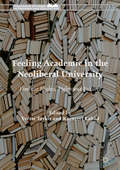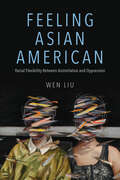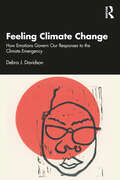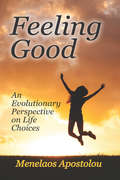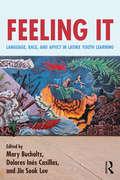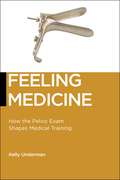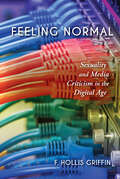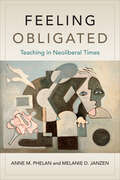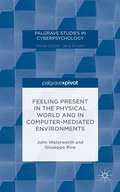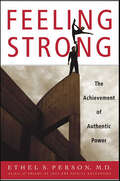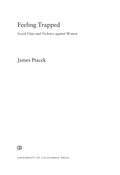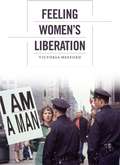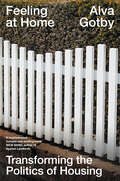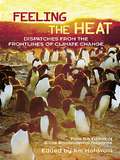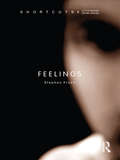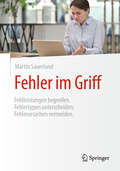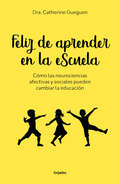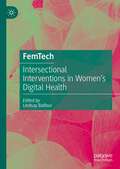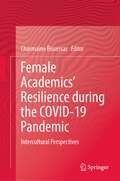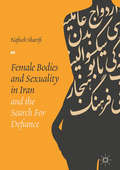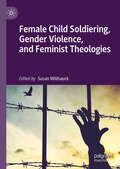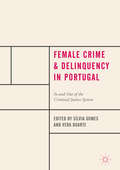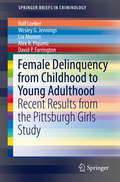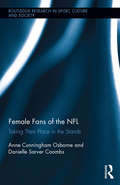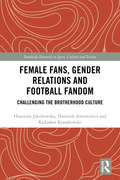- Table View
- List View
Feeling Academic in the Neoliberal University: Feminist Flights, Fights and Failures (Palgrave Studies in Gender and Education)
by Yvette Taylor Kinneret LahadThis book offers a contemporary account of what it means to inhabit academia as a privilege, risk, entitlement or a failure. Drawing on international perspectives from a range of academic disciplines, it asks whether feminist spaces can offer freedom or flight from the corporatized and commercialized neoliberal university. How are feminist voices felt, heard, received, silenced, and masked? What is it to be a feminist academic in the neoliberal university? How are expectations, entitlements and burdens felt in inhabiting feminist positions and what of 'bad feeling' or 'unhappiness' amongst feminists? The volume consider these issues from across the career course, including from 'early career' and senior established scholars, as these diverse categories are themselves entangled in academic structures, sentiments and subjectivities; they are solidified in, for example, entry and promotion schemes as well as funding calls, and they ask us to identify in particular stages of 'being' or 'becoming' academic, while arguably denying the possibility of ever arriving. It will be essential reading for students and researchers in the areas of Education, Sociology, and Gender Studies.
Feeling Asian American: Racial Flexibility Between Assimilation and Oppression (NWSA / UIP First Book Prize)
by Wen LiuAsian Americans have become the love-hate subject of the American psyche: at times celebrated as the model minority, at other times hated as foreigners. Wen Liu examines contemporary Asian American identity formation while placing it within a historical and ongoing narrative of racial injury. The flexible racial status of Asian Americans oscillates between oppression by the white majority and offers to assimilate into its ranks. Identity emerges from the tensions produced between those two poles. Liu dismisses the idea of Asian Americans as a coherent racial population. Instead, she examines them as a raced, gendered, classed, and sexualized group producing varying physical and imaginary boundaries of nation, geography, and citizenship. Her analysis reveals repeated norms and acts that capture Asian Americanness as part of a racial imagination that buttresses capitalism, white supremacy, neoliberalism, and the US empire. An innovative challenge to persistent myths, Feeling Asian American ranges from the wartime origins of Asian American psychology to anti-Asian attacks to present Asian Americanness as a complex political assemblage.
Feeling Climate Change: How Emotions Govern Our Responses to the Climate Emergency
by Debra J. DavidsonExamining the social response to the mounting impacts of climate change, Feeling Climate Change illuminates what the pathways from emotions to social change look like—and how they work—so we can recognize and inform our collective attempts to avert further climate catastrophe.Debra J. Davidson engages with how our actions are governed by a complex of rules, norms, and predispositions, central among which operates our emotionality, to assess individual and collective responses to the climate crisis, applying a critical and constructive analysis of human social prospects for confronting the climate emergency in manners that minimize the damage and perhaps even enhance the prospects for meaningful collective living.Providing a crucial understanding of our emotionality and its role in individual behaviour, collective action, and ultimately in social change, this book offers researchers, policymakers, and citizens essential insights into our personal and collective responses to the climate emergency.
Feeling Good: An Evolutionary Perspective on Life Choices
by Menelaos ApostolouEvery day, people make life choices that, ideally, increase their evolutionary fitness � the chances of survival and successful reproduction � and lead to positive feelings of fulfilment, accomplishment, and happiness. Sometimes, however, individuals experience quite the opposite: feelings of sadness caused by fitness-decreasing choices. Fortunately, many advancements in evolutionary theory and evolutionary psychology have increased humans' capacity as a species to address the question of how to live a life characterized by more positive than negative feelings.Feeling Good reveals anyone can learn how to trigger mechanisms that generate positive feelings and increase positive fitness levels. The key is to employ an evolutionary perspective on how mental mechanisms generate feelings in relation to our life choices.From an insightfully evolutionary perspective, Feeling Good examines how to find and keep a mate, make good career decisions, build a solid social network, deal with death and negative influences, and make life choices in general that can lead to better and more sustainable mental and physical health. Menelaos Apostolou deepens our understanding of human nature by exploring what is good and evil in an evolutionary sense as well as in relation to religious dogmas; and whether making fitness-increasing life choices can lead to more good or more evil acts.
Feeling It: Language, Race, and Affect in Latinx Youth Learning
by Mary Bucholtz Dolores Inés Casillas Jin Sook LeeFeeling It brings together twelve chapters from researchers in Chicanx studies, education, feminist studies, linguistics, and translation studies to offer a cohesive yet broad-ranging exploration of the issue of affect in the language and learning experiences of Latinx youth. Drawing on data from an innovative social justice-oriented university-community partnership based in young people’s social agency and their linguistic and cultural expertise, the contributors are unified by their focus on a single year in the history of this partnership; their analytic focus on race, language, and affect in educational contexts; and their shared commitment to ethnography, discourse analysis, and qualitative methods, informed by participatory and social justice paradigms for research with youth of color. Designed specifically for use in courses, with theoretical framing by the co-editors and ethnographic contributions from leading and emergent scholars, this book is an important and timely resource on affect, race, and social justice in the United States. Thanks to its interdisciplinary grounding, Feeling It will be of interest to future teachers and to researchers and students in applied linguistics, education, and Latinx studies, as well as related fields such as anthropology, communication, social psychology, and sociology.
Feeling Medicine: How the Pelvic Exam Shapes Medical Training (Biopolitics #21)
by Kelly UndermanHonorable Mention, Sociology of the Body and Embodiment Best Publication Award, given by the Body and Embodiment Section of the American Sociological AssociationThe emotional and social components of teaching medical students to be good doctorsThe pelvic exam is considered a fundamental procedure for medical students to learn; it is also often the one of the first times where medical students are required to touch a real human being in a professional manner. In Feeling Medicine, Kelly Underman gives us a look inside these gynecological teaching programs, showing how they embody the tension between scientific thought and human emotion in medical education. Drawing on interviews with medical students, faculty, and the people who use their own bodies to teach this exam, Underman offers the first in-depth examination of this essential, but seldom discussed, aspect of medical education. Through studying, teaching, and learning about the pelvic exam, she contrasts the technical and emotional dimensions of learning to be a physician. Ultimately, Feeling Medicine explores what it means to be a good doctor in the twenty-first century, particularly in an era of corporatized healthcare.
Feeling Normal: Sexuality and Media Criticism in the Digital Age
by F. Hollis GriffinAn analysis of emerging LGBTQ+ media, queer spaces in urban areas, and sexual identity.The explosion of cable networks, cinema distributors, and mobile media companies explicitly designed for sexual minorities in the contemporary moment has made media culture a major factor in what it feels like to be a queer person. F. Hollis Griffin demonstrates how cities offer a way of thinking about that phenomenon. By examining urban centers in tandem with advertiser-supported newspapers, New Queer Cinema and B-movies, queer-targeted television, and mobile apps, Griffin illustrates how new forms of LGBTQ+ media are less “new” than we often believe. He connects cities and LGBTQ+ media through the experiences they can make available to people, which Griffin articulates as feelings, emotions, and affects. He illuminates how the limitations of these experiences—while not universally accessible, nor necessarily empowering—are often the very reasons why people find them compelling and desirable.“As a guide to emerging queer media of our new century, Hollis Griffin is funny, generous, passionate, and lucid. Whether he’s explaining Grindr’s memes or the gayborhoods of Chicago, cable travel programs or online networks, Griffin discovers how it feels to be queer in the digital age.” —Amy Villarejo, author of Ethereal Queer: Television, Historicity, Desire“Offers a piercing examination of modern identity politics focused on relationships among new forms of media consumption and marketplaces, urban centers, and the experiences of sexual minorities. . . . Feeling Normal is a must-read for scholars and students in queer studies and communication, media studies, film studies, and sociology.” —Choice
Feeling Obligated: Teaching in Neoliberal Times
by Anne M. Phelan Melanie D. JanzenFeeling Obligated combines theoretical insights with the first-hand experiences of Canadian teachers to illustrate the impact of neoliberalism – the installation of market norms into educational and social policies – on teachers’ professional integrity. Anne M. Phelan and Melanie D. Janzen illustrate the miserable conditions in which teachers teach, their efforts to navigate and withstand those circumstances, and their struggle to respond ethically to students, especially those already marginalized economically and socially. Exploring how educational policies attempt to recast teachers as skilled clinicians, the book revitalizes a conversation about teaching as a vocation wherein the challenge of obligation is of central concern. Haunted by what has already happened and threatened by what may yet occur, Feeling Obligated foregrounds the challenge of ethical obligation in teaching and makes a strong case for the revitalization of teaching as a vocation, involving commitment, resolve, and trust in a future yet to come.
Feeling Present in the Physical World and in Computer-Mediated Environments
by Giuseppe Riva John WaterworthThis concise volume presents for the first time a coherent and detailed account of why we experience feelings of being present in the physical world and in computer-mediated environments, why we often don't, and why it matters - for design, psychotherapy, tool use and social creativity amongst other practical applications.
Feeling Strong: How Power Issues Affect Our Ability to Direct Our Own Lives
by Ethel S. PersonIn Feeling Strong, noted psychoanalyst Ethel S. Person redefines the notion of power. Power is often narrowly understood as the force exerted by the politicians and business leaders who seem to be in charge and by the rich and famous who monopolize our headlines. The whiff of evil we often catch when the subject of power is in the air comes from this one conception of power-- the drive for dominance over other people, or, in its most extreme form, an overriding and often ruthless lust for total command. But this is far too limited a definition of power.Pointing to a more fulfilling sense of self-empowerment than is being touted in pop-psychology manuals of our time, Feeling Strong shows us that power is really our ability to produce an effect, to make something we want to happen actually take place. Power is a desire and a drive, and it central in our lives, dictating much of our behavior and consuming much of our interior lives.We all have a need to possess power, use it, understand it and negotiate it. This holds true not just in mediating our sex and love lives, our family lives and friendships, our work relationships but in seeking to realize our dreams, whether in pursuit of our ambitions, expression of our creative impulses, or in our need to identify with something larger than ourselves. These separate kinds of power are best described as interpersonal power and personal power, respectively, and they call on different parts of our psyche. Ideally, we acquire competence in both domains.Drawing from her expertise honed in clinical practice, as well as from examples in literature and true-life vignettes, Person shows how we can achieve authentic power, a fundamental and potentially benevolent part of human nature that allows us to experience ourselves as authentically strong. To find something that matters; to live life at a higher pitch; to feel inner certainty; to find a personality of your own and effectively plot our own life story -- these are the forms of power explored in the book. To achieve and maintain such empowerment always entails struggle and is a life-long journey. Feeling Strong will lead the way.
Feeling Trapped: Social Class and Violence against Women (Gender and Justice #9)
by James PtacekThe relationship between class and intimate violence against women is much misunderstood. While many studies of intimate violence focus on poor and working-class women, few examine the issue comparatively in terms of class privilege and class disadvantage. James Ptacek draws on in-depth interviews with sixty women from wealthy, professional, working-class, and poor communities to investigate how social class shapes both women's experiences of violence and the responses of their communities to this violence. Ptacek's framing of women's victimization as "social entrapment" links private violence to public responses and connects social inequalities to the dilemmas that women face.
Feeling Women's Liberation
by Victoria HesfordThe term women's liberation remains charged and divisive decades after it first entered political and cultural discourse around 1970. In Feeling Women's Liberation, Victoria Hesford mines the archive of that highly contested era to reassess how it has been represented and remembered. Hesford refocuses debates about the movement's history and influence. Rather than interpreting women's liberation in terms of success or failure, she approaches the movement as a range of rhetorical strategies that were used to persuade and enact a new political constituency and, ultimately, to bring a new world into being. Hesford focuses on rhetoric, tracking the production and deployment of particular phrases and figures in both the mainstream press and movement writings, including the work of Kate Millett. She charts the emergence of the feminist-as-lesbian as a persistent "image-memory" of women's liberation, and she demonstrates how the trope has obscured the complexity of the women's movement and its lasting impact on feminism.
Feeling at Home: Transforming the Politics of Housing
by Alva GotbyOur feelings about housing are political, and a grasp of them is essential to solving the housing crisis – from the author of They Call It LoveHousing is more than bricks and mortar. The home is where our hopes and dreams play out, and it lies at the heart of our lives. This is where we rest, eat, and relax. The home we enjoy can determine our health, life expectancy, and day-to-day well-being. In contrast, the lack of a stable residence can lead to mental and physical illness and often premature death. This is central to how we conceive of a good and dignified life.Feeling at Home grapples with the practical and emotional questions of housing – domestic labour, privacy, security, ownership, and health. Is it possible to imagine success without home ownership? Alva Gotby makes clear that solving the housing crisis is about much more than housing stock. It is about revolutionising our everyday lives and labours.
Feeling the Heat: Dispatches from the Front Lines of Climate Change
by From the Editors of E/The Environmental MagazineFor an increasing number of people, global warming is not an academic and scientific debate, but a matter of survival. As the planet warms at a rate of four degrees Fahrenheit per century, violent storms are increasing in frequency, icebergs are melting, sea level is rising, species are losing their habitats, and temperature records are being broken. Feeling the Heat consists of chapter-length visits by well-known authors to actual world "hot" spots, where people are already coping day-to-day with the consequences of climactic disruption. The locations for the book were strategically chosen because each represents a separate and important global warming impact, such as rising tides, melting glaciers, evolving ecosystems and air pollution. Feeling the Heat takes global warming out of the realm of armchair speculation and arcane scientific debate, revealing the process of climate change to be ongoing, serious and immediate.
Feelings (Shortcuts)
by Stephen FroshEveryone talks about their feelings, but what exactly are they? What are the distinguishing features of feelings, and how do they differ from emotions and affects? How do our feelings influence the kinds of people we are, and the sorts of communities and societies in which we live? In this wonderful short book, acclaimed author Stephen Frosh interrogates the terrain of feelings and asks how this ‘hidden’ dimension of the self helps shape our worlds. The book provides an accessible and thought-provoking introduction to the major debates around feelings in the modern world. Feelings is an accessible and engaging resource for students, academics, and indeed anyone with an interest in gaining a better understanding of this fundamental area of life.
Fehler im Griff: Fehlleistungen begreifen. Fehlertypen unterscheiden. Fehlerursachen vermeiden.
by Martin SauerlandDieses Buch enthält alles, was Sie über Fehler, Fehlerursachen, vor allem aber über die Möglichkeiten der Vermeidung von Fehlern bei typischen Bürotätigkeiten wissen müssen. Sie kennen es (natürlich nur vom Hörensagen): Die Originalvorlage im Kopierer liegen lassen, eine E-Mail ohne den erforderlichen Anhang versenden, eine vertrauliche Nachricht falsch adressieren, eine Rechnung über 17683 € statt über 17863 € ausstellen oder eine Stelle mit einer inkompetenten Person besetzen – menschliche Fehlleistungen sind ärgerlich, zumeist auch peinlich, zuweilen auch enorm kostspielig. Im Rahmen zahlreicher wissenschaftlicher Analysen sind wir den Häufigkeiten, Typen, Ursachen und Bewältigungsmöglichkeiten solcher Heimsuchungen auf den Grund gegangen. Die Befunde werden auf beispielhafte, anschauliche und amüsante Weise vorgestellt. Der Fokus liegt dabei auf den tieferliegenden motivationalen Fehlerursachen. Die Berücksichtigung dieser energetischen Komponente ermöglicht es nämlich, neue und wirkmächtige Strategien zur Vermeidung von Fehlern in einer immer komplexer und dynamischer werdenden Arbeitswelt zu entwickeln. Die entsprechenden Methoden können von Mitarbeitenden und Führungskräften niedrigschwellig, unmittelbar und selbstgesteuert angewendet werden. Vielleicht ist es durch authentisch-motiviertes Handeln sogar möglich, so etwas wie subjektiv erlebte Fehlerfreiheit zu erreichen. Doch lesen Sie selbst! Zum Autor: Dr. Martin Sauerland, Professor für Arbeit und Organisation an der Hochschule für öffentliche Verwaltung und Finanzen in Ludwigsburg.
Feliz de aprender en la escuela
by Catherine GueguenTodos los niños sienten, en los primeros años de su vida, una necesidad innata de aprender. Sin embargo, son muchos los que al llegar a la escuela frenan su creatividad, parecen no encajar y muestran síntomas de ansiedad y de frustración. ¿Qué está pasando? Para Catherine Gueguen, pediatra, especialista en comunicación no verbal y un nombre de referencia en la educación de los más pequeños, la causa se halla en un modelo educativo obsoleto, centrado en las relaciones de poder, la disciplina y el castigo, y eso, para el cerebro de un niño -maleable, inmaduro y frágil en grado sumo-, es tremendamente perjudicial. En opinión de Gueguen, la única forma de cambiar el sistema es replantear, y sobre todo reivindicar, la figura del profesor, y la clave para ello es la empatía. El profesor debe fomentar por encima de todo la empatía: - escuchar, - respetar - y animar al alumno a expresar sus emociones, sean estas buenas o malas. En definitiva, hacer del aula un lugar donde el niño o el adolescente se sienta seguro, valorado y querido. El resultado, como demuestran los cientos de estudios científicos y los testimonios que acompañan a este libro, no puede ser más alentador: el niño no solo se siente más contento, más comprometido y participativo en el aula, sino que su rendimiento escolar también mejora.
FemTech: Intersectional Interventions in Women’s Digital Health
by Lindsay BalfourThis edited collection draws from cultural studies and Feminist Science and Technology Studies to offer a timely and exciting intervention into the growing field of women’s digital health. It explores the intersection of gender and embodied computing, with particular attention to access barriers and the forms of biometric surveillance that operate in wearables, ingestibles, and embeddables marketed to women (the industry generally known as “FemTech”). While the most utilized and profitable FemTech products include ovulation and fitness trackers, reproductive technologies, contraceptive microchips, and “smart” pills, this only represents a fraction of health concerns affecting women. This volume aims to explore FemTech within the context of Feminist Science and Technology Studies, whereby the entanglements of race, class, gender, ability, sexuality and other social and cultural identities are brought to the fore. By addressing the gaps in FemTech research and socio-cultural barriers to access, this volume critiques the forms of knowledge and experience produced through medical and cultural discourses regarding women’s bodies to both highlight the inequalities in women’s digital health, and imagine alternative models which optimise technology for women in a way that is safe, accessible, and inclusive.
Female Academics’ Resilience during the COVID-19 Pandemic: Intercultural Perspectives
by Charmaine BissessarThis edited book encompasses themes related to resilience during the pandemic with a special focus on what female academics did to hone their resilience. It addresses issues of resilience related to mental health, care and well-being, leading, teaching, and learning. The book offers the reader a glimpse into the academics’ lived experiences and shows how they negotiated and navigated the pandemic. Each academic discusses challenges and triumphs such as wellness, leadership, work-life balance, and workplace burnout.The information contained in the book is significant to different parts of the world such as Guyana, Trinidad, Jamaica, Ireland, England, USA, US Virgin Islands, India, Tanzania, Philippines and China. The authors come from various backgrounds with experiences that add to the multi-cultural and multifaceted nature of resilience. They are leading practitioners who have been involved in face-to-face and online teaching, leading and learning for many years. The book brings with it the experience, enculturation, and wealth of knowledge which is of value to academics, researchers, and policy makers who wish to interrogate and understand the concept of resilience.
Female Bodies and Sexuality in Iran and the Search for Defiance
by Nafiseh SharifiThis book uses storytelling as an analytical tool for following wider social attitude changes towards sex and female sexuality in Iran. Women born in 1950s Iran grew up during the peak of secularization and modernization, whereas those born in the 1980s were raised under the much stricter rules of the Islamic Republic. Using extensive ethnographic research, the author juxtaposes narratives of body and sexuality shared by these different generations of women, showing the intricate ways in which women construct and convey meanings and communicate their emotions about the unspoken aspects of their lives.
Female Child Soldiering, Gender Violence, and Feminist Theologies
by Susan WillhauckThis book examines the phenomenon of female child soldiering from various theological perspectives. It is an interdisciplinary work that brings Christian feminist theologies into dialogue to analyze the complex ethical, geopolitical, social, and theological issues involved in the militarization of girls and women and gender-based violence. With contributions from a range of interdisciplinary and multicultural authors, this book offers reflections and perspectives that coalesce as a comprehensive overview of feminist theological insights into child soldiering.
Female Crime and Delinquency in Portugal: In And Out Of The Criminal Justice System
by Sílvia Gomes Vera DuarteThis book compiles research on female crime and delinquency in Portugal in order to critically and reflectively explore interdisciplinary views on the link between gender, crime and delinquency. Contributions are organized into two main parts, with Part I dedicated to the relationship between women and crime, and Part II focused on female juvenile delinquency. Through the exploration of girls’ and women’s relationships with delinquency and crime, as well as with the justice system, this original and compelling collection highlights the heterogeneity of girls’ and women's experiences, whilst also underlining the convergences and divergences between them.Ultimately, Gomes and Duarte argue that understanding how women and girls explain their offending behaviours and how they relate to the criminal justice system is of the utmost importance for reforming social and legal policies. As such, this book will be of value not only for students, researchers and professionals of the social, behavioural and criminal sciences, but also for policy-makers seeking to provide greater efficiency in preventing crime and delinquency.
Female Delinquency From Childhood To Young Adulthood
by Rolf Loeber David P. Farrington Wesley G. Jennings Alex R. Piquero Lia AhonenThis Brief fills a gap in criminological literature, as there are few empirically-based studies on delinquency of adolescent girls. It provides results of a longitudinal study, The Pittsburgh Girls Study (PGS), which includes 2,451 girls, followed annually from age 10-19, the ages when criminal behavior tends to emerge. This study provides the most extensive and comprehensive investigation into the criminal offending and self-reported trajectories of offending of PGS participants, along with an in-depth examination of other criminal career dimensions. In five chapters, this short volume reviews the limited extent of girls' delinquency literature, presents data on girls' offending patterns (onset, persistence, specialization, and desistence), provides insights on gender differences by comparison with the Pittsburgh Youth Study, which focused on male offenders, and explores the theoretical and practical implications of the results. By understanding the origins and onset of criminal behavior in girls, researchers can begin to understand effective interventions and crime prevention. This Brief will be of interest to researchers in criminology and criminal justice, as well as related fields such as sociology, public policy, and psychology.
Female Fans of the NFL: Taking Their Place in the Stands (Routledge Research in Sport, Culture and Society #49)
by Anne Cunningham Osborne Danielle Sarver CoombsIn the past, sport, particularly football, has been defined as a male domain. Women’s interest stereotypically ranges from gentle tolerance to active resistance. But increasingly, women are proudly identifying themselves as supporters of their teams, and have become highly desirable audiences for sport organizations and merchandisers. Football provides a unique site at which to examine the complex interplay between three theoretical areas: identity formation and maintenance, commercialization of cultural practices, and gender hegemony. This book explores how women experience their fandom, and what barriers exist for the female fan.
Female Fans, Gender Relations and Football Fandom: Challenging the Brotherhood Culture (Routledge Research in Sport, Culture and Society)
by Honorata Jakubowska Radoslaw Kossakowski Dominik AntonowiczThis book assesses the transformation of football fan culture from a gender perspective. Referring to the notions of homosociality, hegemonic masculinity and performative perspectives on gender and fandom, it investigates the processes of women entering the world of football fandom. Drawing on multidimensional qualitative and quantitative research, the book analyses different aspects of female fandom, such as women’s socialisation to be a fan, building their sense of fan identity, ways of performing fandom, and gender. Also, it explores the response of male fans by shedding light on the sense-making process of a growing number of female fans in the stands and its consequences for prevailingly male football culture. This study stands out for its richness and diversity of empirical material used in order to make a significant contribution to our understanding of social dynamics related to the changing nature of female football fandom. The book is fascinating reading for researchers and students in a broad range of areas, including gender studies, sociology of sport, football, women’s studies and Central Eastern European studies. It is also a valuable resource for scholars, and football and club authorities who have an interest in understanding the development of female football fandom and its impact on the male fandom community.
